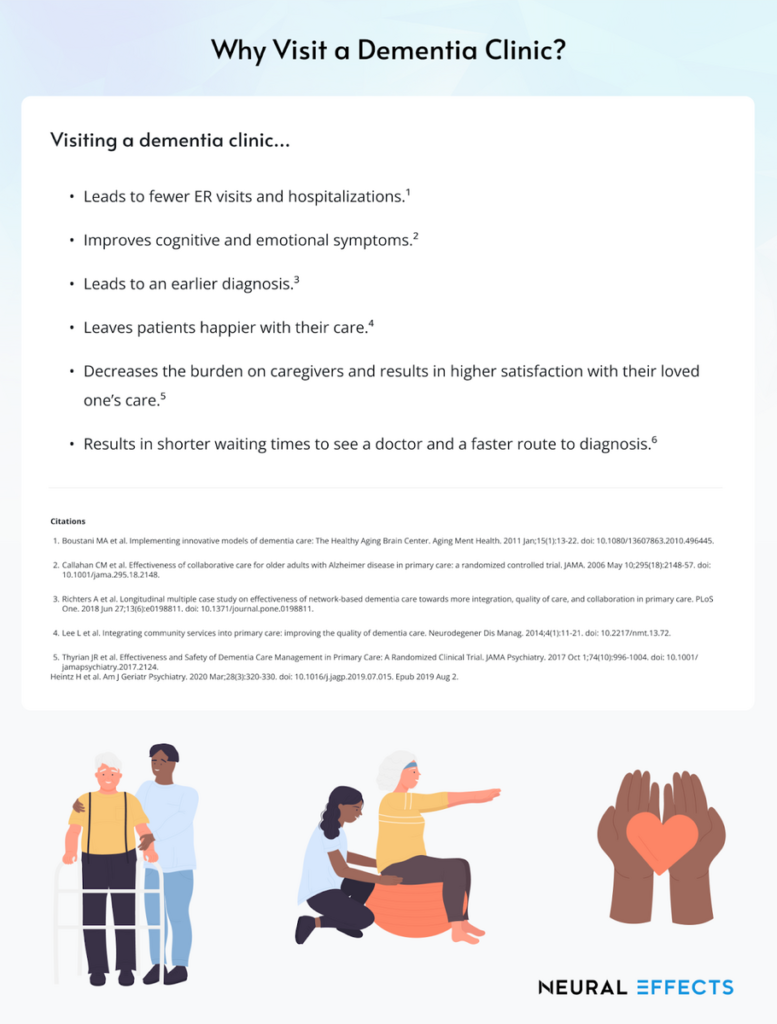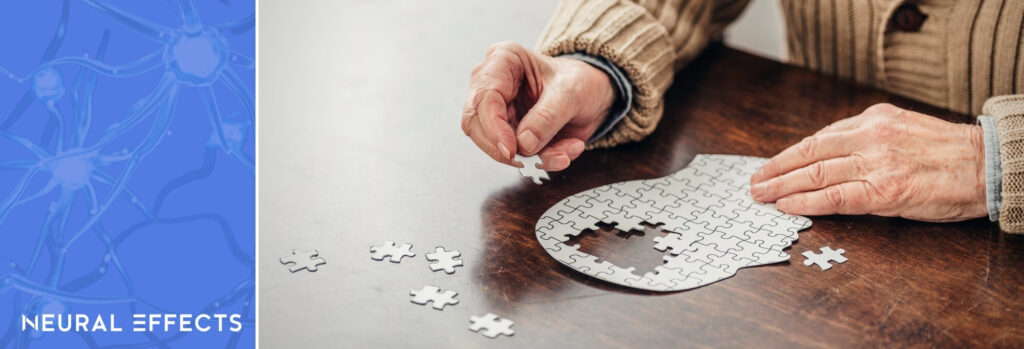If you or a loved one has been diagnosed with dementia, you may wish to find therapeutic support to help with managing symptoms or maintaining autonomy in daily life. However, because there are many different types of dementia and associated symptoms, the best therapy for any given patient depends on their specific needs.
Patients can suffer from a wide range of cognitive, physical, and emotional symptoms. For example, patients with Alzheimer’s often start by noticing cognitive problems, such as difficulty following conversations or frequently misplacing items, whereas patients with Lewy Body dementia are more likely to experience difficulties with movement and sleep disturbances.
As such, there is a wide range of therapies that patients with dementia may participate in to meet their specific needs. In this article, we provide a comprehensive list of therapists you can work with, grouped as:
- Therapists to address cognitive symptoms
- Therapists to address physical symptoms
- Therapists to address emotional symptoms
- Therapists to promote stimulating activities
- Therapists to treat common medical conditions in dementia patients
In many cases, patients will need care from more than one therapist. Yet, assembling a care team can involve a frustrating number of appointments, waiting around for results and referrals, and more. It’s time-consuming for the patient, as well as for family members and caregivers who are trying to ensure they receive the medical care they need.
This makes dementia clinics appealing because you can find more care under one roof and/or assistance coordinating care among dementia therapists. So, in addition to covering the different types of therapists you can work with below, we’ll also discuss the option of dementia clinics and the treatment we offer at our clinic, Neural Effects.
Neural Effects uses the latest evidence-based techniques to diagnose and help patients with dementia. We are located in Provo, Utah, and serve anyone in Salt Lake City or the Utah Valley area. We are in-network for most types of medical insurance.Schedule your evaluation today.
Therapists to Address Cognitive Issues

Cognitive problems, including memory lapses, problems following conversations, and being confused about time and place, are common symptoms in patients with dementia, especially those with Alzheimer’s disease. These symptoms cause patients to struggle with activities of daily living (ADLs) and eventually prevent them from living independently.
Interventions that can slow down this cognitive decline are key to improving the patient’s quality of life and ensuring they can remain independent for as long as possible. Exercising the brain with activities that promote cognitive skills encourages a mechanism called neuroplasticity. In simple terms, cognitive therapy helps the brain create new neural pathways and strengthens existing ones, reducing dementia symptoms, such as memory loss and disorientation.
Studies show that while older adults may lose some cognitive function, their brains retain the ability to change in response to therapy. However, any gains in a particular cognitive function are not easily transferred to another. In practical terms, this means exercises to improve memory, for example, often don’t help with problem-solving skills. This makes it all the more important for patients to follow a therapy plan that addresses more than just one symptom.
Some of the therapists who can help with these symptoms include cognitive therapists and speech and language therapists.
Cognitive Therapists
During the early stages of the disease, patients with dementia can benefit from cognitive therapy, such as cognitive training, cognitive rehabilitation, or cognitive stimulation therapy (all of which we use at Neural Effects). We’ve written in more detail about these different cognitive therapies in a previous article.
In general terms, cognitive therapists use a variety of activities during their sessions, such as games, puzzles, discussion of current affairs, and practical activities, like cooking or gardening. The aim is to slow down the patient’s cognitive decline and improve memory, thinking, language, executive functions, concentration, and other cognitive skills. As a consequence, patients find it easier to engage in activities of daily living (ADLs) and experience fewer symptoms of anxiety and depression. This therapy can be used in patients at risk for dementia, those diagnosed with mild cognitive impairment (MCI), and those already diagnosed with dementia.
Further reading: Memory therapy for dementia
Speech and Language Therapists
Speech and language therapists can also help individuals with dementia who are experiencing cognitive issues that are mainly related to problems with communication and language, including difficulties processing information, problems with voice and/or speech, difficulty reading, and swallowing difficulties. Studies show that this therapy can help patients with dementia improve their understanding of spoken and written language, as well as with expressing their thoughts and ideas. In the later stages of the disease, these therapists also assess and treat swallowing problems.
Typically, therapists offer a series of customized exercises to improve speech and language, as well as access to support groups, advice, and education for patients and caregivers.
Reminiscence Therapists
Reminiscence therapists guide patients in discussions about past events and experiences, typically using props, such as videos, music, pictures, and objects that hold a special meaning for the patient. Possible topics for discussion include childhood events, food likes and dislikes, family and relationships, and favorite sports teams.
For patients in the early stages of dementia, this therapy improves depressive symptoms, helps with communication, improves long-term memory, and delays further cognitive decline. During later stages, it doesn’t have the same impact, but it can still help patients feel less anxious or stressed by looking at old photos or listening to their favorite music.
Therapists to Address Physical Issues
Individuals with dementia may also experience physical complications, such as stiff and/or weak muscles, fatigue, loss of coordination, and increased risk of falls.
These patients need therapy to help them stay physically active so they can continue to perform their roles at home and in the community. Therapy improves balance, relieves stiff muscles, improves muscle strength, and increases fitness. In turn, patients can move more comfortably and are less likely to fall and injure themselves.
Physical activity also helps cognitive skills by promoting blood flow to the brain and inducing long-term changes in areas of the brain that are key to forming memories and memory retrieval. One study found that loss of cognitive function is twice as common in inactive patients compared to those who are active.
Finally, physical activity reduces stress and improves mood by reducing the levels of cortisol and promoting the release of “feel-good” chemicals called endorphins in the brain. This boosts patients’ self-esteem and makes them more willing to socialize.
Physical therapy (also called physiotherapy) and occupational therapy are ideal tools to help these patients.
Physical Therapists
Physical therapists — also known as physiotherapists — are trained to assess physical problems and suggest exercises to help patients continue their daily activities. Exercises include, for example, gentle stretching for weak muscles, balance exercises to improve posture, or seated exercises for patients with low mobility. The aim is to encourage patients to stay active to maintain their mobility and independence as long as possible.
Many studies show physical therapy is beneficial for both cognitive and physical skills in patients with mild cognitive impairment (MCI) and dementia, including reducing the risk of falls, increasing muscle strength, and improving mood.
Further reading:
Occupational Therapists
Occupational therapists help dementia patients find the best way to maintain daily functioning, social interactions, and well-being. In practical terms, this includes:
- Recommending ways to adapt the patient’s living space, such as adding dementia-friendly clocks or labeling doors
- Suggesting ways to manage symptoms such as fatigue or balance issues
- Developing strategies to help manage memory loss
- Helping the patient develop a daily routine to structure the day and provide stability
- Providing emotional support and information about available support groups for patients and caregivers
Further reading: Occupational therapy for dementia
Therapists to Address Emotional Issues

Patients with dementia often struggle with feelings of grief, loss, anger, shock, and fear. They may become afraid of what’s going to happen to them in the future and worry about the impact their condition has on their loved ones. As a result, they often experience anxiety, depression, and other mental health problems.
When these symptoms occur, it’s helpful to work with mental health professionals who specialize in treating mental health conditions in older patients, such as geriatric psychiatrists, geropsychologists, or neuropsychologists. These therapists can offer psychotherapy sessions to give patients a chance to speak about their emotions, including how they feel about their diagnosis. They can also help patients develop coping skills and other strategies to cope with negative emotions and show them ways to communicate more effectively with carers and loved ones. As a result, patients learn to deal with behavioral problems, including aggression, repetitive behavior, and aimless walking, which increases their sense of control and self-esteem. Studies show that this type of therapy is often more effective than antidepressants or antipsychotics in dealing with emotional symptoms.
Collectively, this therapy is known as talk therapy and includes counseling and cognitive behavioral therapy (CBT). It is more effective during the early stages of the disease. As the disease progresses, patients may lose the ability to effectively engage in this therapy because of attention and communication deficits.
In practical terms, these licensed professional counselors and therapists help patients with dementia by:
- Offering neuropsychological evaluations
- Assessing whether mental health conditions, such as depression and anxiety, are caused by or comorbid with dementia
- Treating symptoms of depression, anxiety, or other mental health disorders (which may involve prescription drugs)
- Helping with behavioral issues such as aggression
- Offering referrals to other health professionals, such as neurologists or geriatricians, if needed
- Assessing whether current medications may be causing problems with memory and thinking
- Helping patients prepare emotionally for end-of-life
Therapists to Promote Stimulating Activities

Patients with dementia may also engage in therapies that consist of general recreational activities, such as doing art, listening to music, or playing with pets. Many different therapies fall within this category, but the general aim is to allow patients to engage in pleasurable activities, encourage social interactions, and stimulate the patients’ minds. Various studies have shown that patients can experience improvements in cognitive skills through art and music therapy, for example.
Asking patients to do something creative, such as painting or listening to certain music, can also help them reminisce about past events. This improves their memory, gives them a boost of confidence, and improves their quality of life. More physical activities, such as dancing or taking a dog for a walk for example, also help with movement and strength. Finally, many of these therapies are done in a group and promote social interactions, decrease isolation, and improve mental health.
Some of the therapies included in this group include:
- Sensory stimulation therapy
- Art therapy
- Music therapy
- Pet therapy
- Doll therapy
- Aromatherapy
Sensory Stimulation Therapists (Sensory Integration Therapists)
Sensory stimulation therapists help patients use their five senses — hearing, sight, smell, taste, or touch — to remember positive emotions and memories. The aim is to trigger happy memories to make patients feel safe and relaxed, as well as to promote a better relationship with caregivers. For example, therapists can help patients bake their favorite cake or give them a bouquet of their favorite flowers to smell.
This therapy is typically carried out by occupational therapists, speech and language therapists, or physical therapists with additional training.
Art Therapists
Especially for patients in the early stages of the disease, art therapists can help patients enjoy their creative side by sculpting, painting, drawing, making cards, or creating jewelry. Studies show that engaging in art activities boosts cognitive function, enhances communication, and promotes social interaction for dementia patients. This therapy also reduces agitation and gives patients a sense of purpose by providing an opportunity for nonverbal expression.
This type of therapy is typically done by a trained art therapist or a psychotherapist/psychologist with specialized training (sometimes called art psychotherapist or art psychologist).
Music Therapists
Music therapists use music to help dementia patients. Activities may include learning to play a musical instrument, singing, listening to their favorite song, or even attending musical concerts. This type of therapy improves behavior problems, lowers anxiety, and controls agitation. In addition, singing and/or learning to play a new musical instrument keeps a patient’s brain active and engaged and improves cognitive function.
Music therapists also teach caregivers to use music as a way to calm patients down. For example, if patients in the later stages of the disease get agitated and struggle to get dressed, playing their favorite music can help them calm down enough to accept help.
Pet Therapy
Animal lovers may enjoy the company of a pet therapist (also called an animal-assisted therapist). Petting an animal — most commonly cats or dogs — reduces agitation and aggression and improves the patient’s mood. This therapy also promotes social interactions when done in a group setting and stimulates physical activity for patients who can still go out and play with an animal.
Typically, these sessions are offered by psychologists or psychotherapists with a specialization in animal-assisted therapy.
Doll Therapists
For patients with severe dementia, doll therapists are trained to use dolls (and other items) as a tool to help patients reminisce about past events. This therapy improves communication, promotes social interaction, reduces the use of antipsychotic drugs, prevents wandering, and improves quality of life.
These sessions are run by trained professionals, including psychotherapists and psychologists (usually as part of talk therapy) or by nurses in dementia care facilities.
Aromatherapists
Aromatherapists use different essential oils during massage to reduce stress and promote well-being in patients with dementia. These services are not suitable for every patient. It may not be suitable for patients who don’t like being touched or who have skin conditions such as psoriasis or eczema.
Ideally, you should find an aromatherapist with special training or experience in helping patients with dementia.
Therapists to Treat Medical Conditions Common in Patients with Dementia

Patients with dementia often experience other common medical conditions, such as sleep disturbances or vision issues, and will need the help of other healthcare specialists.
Some examples include:
- Optometrists, opticians, and other medical staff involved in eye care: These therapists conduct routine checkups, prescribe lenses, and carry out any other basic eye care needs. Patients with dementia should have their eyesight checked regularly, as any problems can make patients confused and increase the risk of falls. Ideally, you should find a professional with experience in dealing with patients with dementia, who often need a more caring and supportive approach, because even routine eye tests can be difficult and confusing.
- Audiologists: These therapists can identify problems with hearing and fit a hearing aid if needed. This is crucial for elderly patients, as they can have trouble hearing, which increases confusion and makes social interactions very challenging. Patients need an audiologist specialized in treating dementia patients. These professionals will be more understanding and better able to tailor the process to the patient’s individual needs.
- Dentists and dental hygienists: These therapists treat tooth decay and gum disease and instruct dementia patients on how to best care for their teeth. Ideally, patients visit a dentist shortly after diagnosis to develop a long-term plan for the time when they will be unable to look after their own teeth. It’s important to find a dentist with experience dealing with dementia patients, as treatment can be stressful and confusing.
- Nutritionists: These therapists advise patients about what to eat. It’s important for individuals with dementia to follow a balanced diet because they can experience poor appetite and weight loss. Eating a poor diet can cause dehydration, constipation, and urinary tract infections (UTIs), which aggravate symptoms of dementia. Nutritionists can suggest ways to overcome any food issues, such as making smoothies (for patients who struggle to swallow) or using low-calorie sweets (for patients with a sweet tooth).
- Sleep specialists: These therapists can advise patients and their caregivers about healthy sleep habits, including going to bed at the same time every day and avoiding the use of mobile phones in the evening. If needed, these specialists can treat severe sleep disturbances with therapy or prescription drugs. Sleep medication is only advised as a short-term treatment because it increases the risk of falls and causes mental confusion.
Dementia Clinics for Getting More Care Under One Roof

Dementia clinics (colloquially called memory clinics) are places where patients with dementia can get more support and treatment under one roof, reducing the need to visit many different medical centers for care.
These clinics bring some of the therapists from the various healthcare specialties described above together and offer patients easier access to treatment. The exact mix of professionals will vary greatly from clinic to clinic. Large centers are more likely to have a wide array of team members in-house, while smaller places need to establish close collaborations with other clinics. Some of the healthcare providers you may find at a dementia clinic include psychiatrists, psychologists, geriatricians, neurologists, as well as physical, occupational, and cognitive therapists, to name just a few.
Clinics are also different in terms of the type of treatments offered. Some focus more on short-term options, such as medication and supplements, while others prefer non-pharmacological treatments (including therapy) and support the patients throughout their disease.
Overall, visiting a dementia clinic:
- Results in fewer ER visits and hospitalizations
- Improves cognitive and emotional symptoms
- Leads to an earlier diagnosis
- Leaves patients happier with their care
- Results in shorter waiting times to see a doctor
- Decreases the burden put on caregivers
- Increases caregivers’ and family members’ satisfaction with the medical care offered to their loved one
Further reading: What to expect from a dementia clinic
Dementia Therapy at Neural Effects

At Neural Effects, we offer the EMPOWER program to treat patients with dementia, using a combination of cardiovascular exercise and cognitive stimulation therapy (CST) to delay cognitive decline and improve the patient’s quality of life. Importantly, we also provide caregivers with resources to help them become educated about the best ways to live with and support individuals with dementia.
CST by itself can protect cognitive function and delay further decline, but our therapists take it one step further by adding short sessions of aerobic exercise. Physical activity stimulates the release of an important neurochemical called brain-derived neurotrophic factor (BDNF), which promotes learning and memory.
Before treatment, patients must complete a neuropsychological assessment (also called a neurocognitive evaluation) to find out how dementia has affected their brains. All patients must undergo these exams, even if they already have a dementia diagnosis. This exam takes about 2-2.5 hours to complete.
Our therapists assess:
- Cognitive skills, such as problem-solving ability, memory, attention, and concentration
- Physical abilities, such as reflexes, eye movements, and balance
- Emotional signs of anxiety, stress, and depression
Once this exam is completed, our therapists combine all the information and create a cognitive care plan (CCP). All patients who are assessed receive their CCP, even if they decide not to continue with treatment. The report contains valuable information to help patients protect their cognitive function and improve their quality of life.
The CCP includes:
- Results from the assessment
- Risk factors and how the disease is likely to progress
- Lifestyle changes that may help the patient
- Ways the family can get involved
- Recommended treatment options
Patients then attend 14 sessions of one-hour-long group therapy sessions, run twice a week for seven weeks. Typically, our sessions include:
- Exercise: Sessions start with a few minutes of aerobic exercise, usually done on a stationary bike or treadmill. Our therapists are trained to adjust the level and intensity of exercise to what patients can do safely.
- Cognitive Stimulation Therapy: Each CST session is different. It may include playing board games, listening to music, or engaging in arts and crafts. For example, in one session, patients might do chair yoga, discuss current events, memorize pictures, and solve cognitive puzzles, all while socializing with their fellow attendees. Overall, CST helps with cognitive skills, such as memory, thinking, and language. It also boosts confidence and improves quality of life.
We recognize that it’s crucial to support caregivers and family members. As such, they’re invited to attend the first session to find out more about CST. This way, they’ll be able to help patients repeat some of the activities and games at home. In addition, our therapists give family members information about local resources and lifestyle changes that can help their loved ones maintain independence for longer and reduce caregiver stress. Finally, if our therapists feel that patients may benefit from additional therapy, we refer them as needed to the appropriate specialists.
Neural Effects uses the latest evidence-based techniques to diagnose and help dementia patients. We are located in Provo, Utah, and serve anyone in Salt Lake City or the Utah Valley area. We are in-network for most types of medical insurance. Schedule your evaluation today.
How and Where to Find the Right Dementia Therapist

If you’re considering therapy, finding the right therapist can be challenging. You need to do your background research and ask as many questions as you can to find the most suitable therapist for you.
Not all of these steps apply to every kind of therapy. For example, it’s easier to find a suitable occupational therapist if you’re looking for short-term advice and treatment, while it can be more challenging to find the right psychiatrist or psychologist to address mental health issues long-term.
Find Out Which Types of Therapy You Need
The first step to choosing a good therapist for you is to find out what kind of therapy services or treatment plan you need. Discuss with your healthcare provider what kind of therapy may be the best option for you. For example, if you’re experiencing dizziness and poor balance, you may need a physical therapist with specific experience in vestibular symptoms. Alternatively, if you’re having emotional and behavioral challenges that are affecting your close relationships, they may recommend looking into family therapy.
Get a Referral
The first place to look for a suitable therapist is from your doctor or clinician. They may be able to refer you directly to a therapist who’s able to address your specific problems and provide you with the treatment you need.
You can also ask around your friends and family. Your loved ones may know somebody local who can cover what you need. Bear in mind that even if a therapist worked with your loved one, they may still not be the best fit for you. The right therapist still depends on your personal needs and therapy goals.
Search Local Resources
You can ask around your community to find a suitable therapist. Examples include:
- Your insurance company: Your insurance provider may have a list of therapists they work with and whose services they cover.
- Other professionals you know: These may include neighbors and work colleagues, even if they don’t work in the healthcare field. If you feel comfortable, ask doctors, lawyers, and other professionals you already trust if they can recommend someone from their professional network.
- Your place of worship: If you’re part of a religious community, there may be people there who can offer recommendations.
Contact National Organizations
If you’re looking for a therapist to help with very specific problems, one option is to contact national organizations dedicated to helping individuals with dementia.
A few examples include:
- Alzheimer’s Association
- Dementia Society of America
- Alzheimer’s Foundation of America
- Family Caregiver Alliance
- US Against Alzheimer’s
- Dementia Friendly America
- Dementia Friends USA
Search Online Databases
Another way to find a suitable therapist is by searching online databases. In most cases, you can type in your ZIP code and type of therapy you’re looking for to generate a list of therapists near you. Some databases also allow you to fine-tune your search and add your specific requirements. For example, you may be able to define you’re looking for a geriatrician psychiatrist rather than just a general psychiatrist.
Bear in mind that inclusion in the database is not a guarantee that the therapist can cover what you need. Some lists only require a fee to be included and don’t check the therapist’s qualifications. So, if you’re looking for a clinical psychologist, for example, you may want to ensure they include “Doctor of Psychology (PsyD)” in their credentials.
Here are a few suggestions for finding different types of therapists:
Cognitive Therapists
Speech and Language Therapists
Physical Therapists
Occupational Therapists
Talk Therapists
Art Therapists
Music Therapists
Pet Therapists
Optometrists
Audiologists
Dentists
Nutritionists
Sleep Specialists
Contact Potential Therapists
When you’ve found a few therapists you’re interested in, send them an email or give them a call. Explain your condition briefly to find out whether they can help you. Most therapists will be able to tell you straight away whether or not they’re trained to deal with your symptoms. Also, this is the time to ask as many questions as possible:
- What is your availability?
- What is your area of expertise?
- What are your credentials?
- Do you have experience with dementia patients? How many years of experience?
- What should I expect from a typical session?
- How is your treatment going to help me?
- How much do you charge?
- What insurance do you accept?
This conversation will give you a sense of what they are like and whether you would feel comfortable working with them.
Contact Your Insurance Provider
If your chosen therapist does not accept insurance, you can ignore this step. If they do, you need to contact your insurance provider to find out exactly what your insurance provider covers and if they limit the number of sessions you can attend each year.
Try a Session
The first session is a chance to see how you feel being with your chosen therapist and get a sense of how they work. They will probably ask you about your symptoms and what you’re expecting from therapy.
It’s important to remember that the first therapist you try may not be the best option for you. Expect some trial and error; trying out several therapists is a normal part of the process. For dementia patients, it’s crucial to find therapists with experience dealing with this condition. Ideally, you’re looking for highly trained and experienced providers with certification in their chosen field. If possible, speak to previous patients to see if the clinic would be a good fit for you. Ultimately, you need to find a therapist with whom you feel comfortable and trust.
It may not be possible for all types of therapy, but consider online or telehealth therapy wherever possible. This is a great resource for patients with chronic illnesses, allowing you to access therapy in your own home. Still, it’s important to find an accredited therapist who specializes in the type of treatment you need.
Neural Effects uses the latest evidence-based techniques to diagnose and help dementia patients. We are located in Provo, Utah, and serve anyone in Salt Lake City or the Utah Valley area. We are in-network for most types of medical insurance. Schedule your evaluation today.
